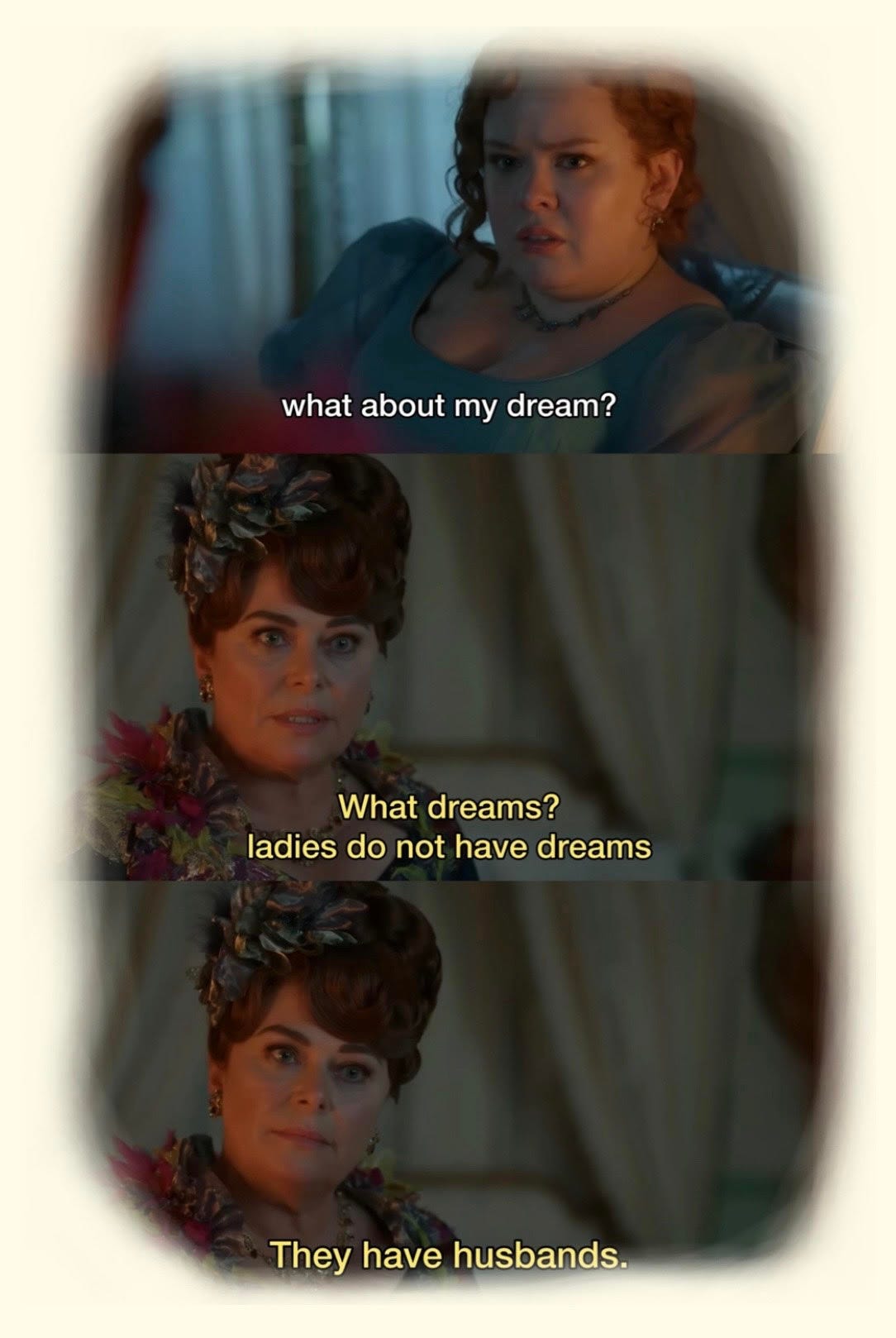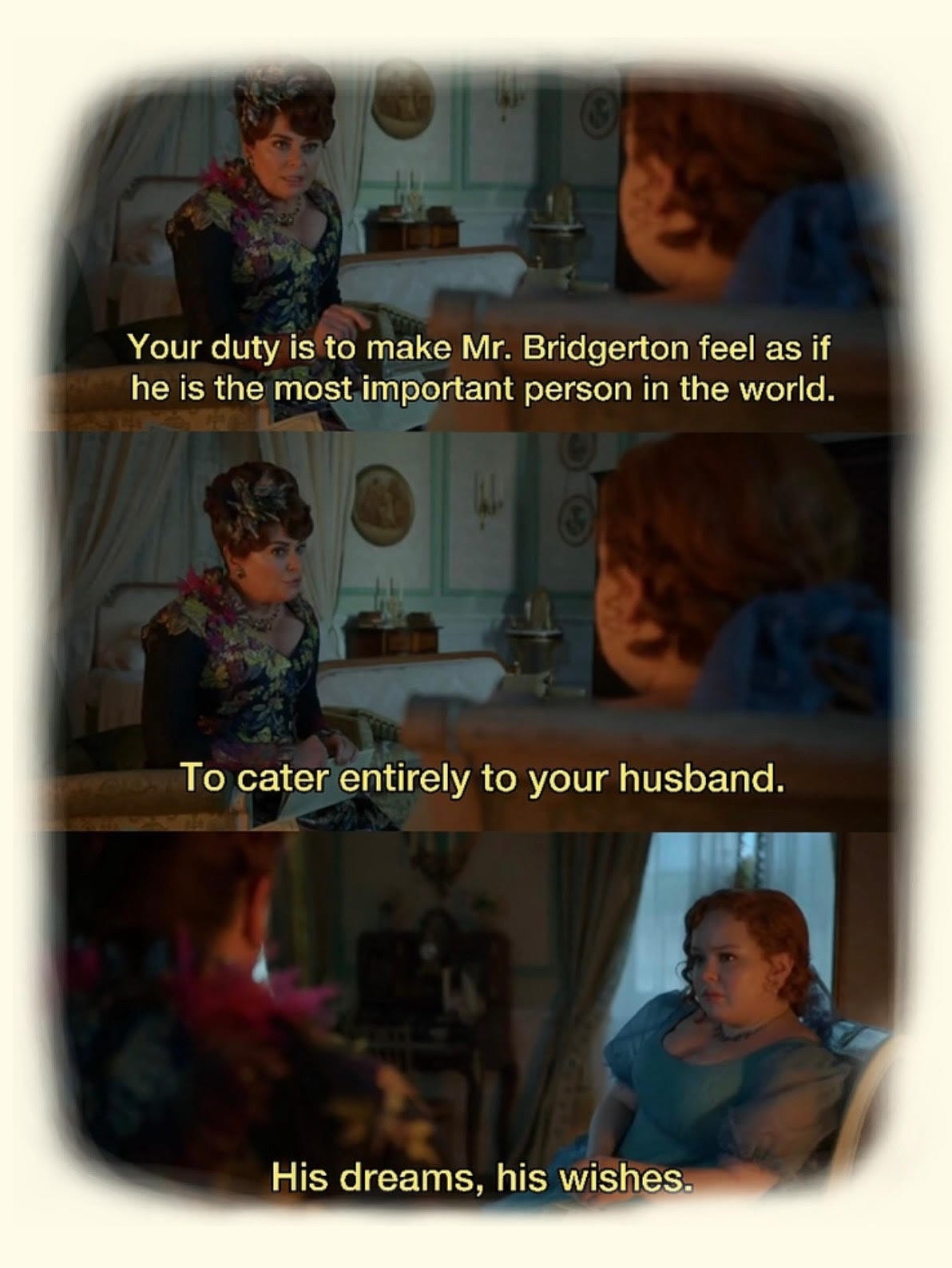“What dreams? Ladies do not have dreams. They have husbands.”
Let's talk about that very real quote from Portia Featherington from episode six, Season three of Bridgerton.
As young as I can remember, my mother always emphasised the importance of being competent in household duties for my future husband. This is a shared experience with many Sudanese women. We are raised to be wives. From age five, you are taught to serve tea, greet guests with a smile, bow to the elders, and go on your knees to serve the uncle’s food.
Even before we immigrated to Australia and I had gained this “Western mentality”, as my mum calls it, I never liked the weight placed on young Sudanese girls. This need for perfection and submission before one even gets their first menstrual cycle continuing till puberty.
When puberty hit, the girl’s family would be arranged to wed a man ten years her senior. Her father would reap the benefits of his wife’s hard work raising their daughter to be the perfect teenage bride.
This early life experience allowed me to strengthen my female friendships through trauma bonding on the lunch benches in high school. Even though we were from different backgrounds, we all had similar experiences being raised in immigrant households ruled by patriarchy, from South Sudan to Turkey, Greece and Fiji. I quickly learned our similarities outweighed our differences when it came to sexism and misogyny.
This shared experience with patriarchy often translates into media, most recently displayed on-screen on the popular Netflix period drama Bridgerton. In the sixth episode of the recent season three, Penelope questions her mother about her dreams when advised to abandon what she wants to appease her husband, Colin Bridgerton. Portia Featherington, Penelope’s mother, responds, “What dreams? Ladies do not have dreams. They have husbands” [21:43, episode six, season three].
Bridgerton is set in Britain during the Regency era, where marriage is a tool for social hierarchy. Young girls are to be married off early in their youth, becoming baby-making machines if they are to secure a life of comfort. The other options for young girls are limited to poverty and an endless cycle of tiresome work and abuse, something Lady Featherington is familiar with.
For noble ladies like Penelope, marrying a well-off man who only cares if his wife does the bare minimum is a dream come true. Yet Penelope is a hopeless romantic in a world where love matches are uncommon. Portia is confused about how her daughter could consider giving up such an opportunity so many girls dream of for something she views so trivial as love. Women in their society do not get many chances to marry a wealthy, decent man with little baggage. Yet, Penelope still hesitates to accept a possible marriage proposal from Mr Debling, one of the season’s most desired bachelors.
Portia Featherington symbolises the authentic experience of many women in the Bridgerton universe who do not have the luxury of marrying for love like the Bridgertons. So, while she appears somewhat of an antagonist in her daughter’s story for dismissing Penelope’s dreams of finding true love, she is simply looking out for her daughter.
As shown in the first half of the season, when Penelope expresses a deep desire to marry for love, Portia is ready to give her daughter a reality check: “You know what is romantic? Security” [23:20, episode four, season three].
Portia’s realistic viewpoint on romantic relationships can come off as harsh. However, at her core, Portia wants to offer her daughters the best chance of happiness and safety in a society that does not value women’s aspirations or talents. Mrs. Featherington’s efforts show her love for Penelope, even if it does not always translate how it’s intended.
Portia Featherington’s way of thinking is still common among women of our times, especially in some immigrant households that still hold on to patriarchal views of their culture. Although this is not an isolated immigrant viewpoint, many people in the West still have a sexist view of relationships and women’s contribution to society.
Every day, I come across a new red-pill content creator feeding young boys with hatred or a woman’s assault being watered down with questions such as, “Well, what did she do”. In general, society is not very kind to women, and men aren’t very welcoming to women’s concerns even when it affects their daughters, mothers and wives. It’s not the 1800s, and society isn’t the Ton, but it often can feel like it with how little humans have evolved mentally and emotionally.
Story-time: When I was around fifteen, I went to an aunt’s house to get my hair braided. We started at nine am, and she had me sit in front of the television. Ideally, we would have finished before her husband got off work, but we did not. He got home around three pm, went straight to the living room, turned on Al Jezerra, and before she could even say hi, he started complaining, “Where’s the food?”. She paused mid-braid to fix him a plate; at no point did he stand up and take the initiative to help bring the load off his wife with their children, who were running around while she tried to do her job.
This was only a short and minor example of how this devaluation of women’s worth has manifested in many households. Husbands are placed on thrones, expected to be incompetent at most, yet praised for the bare minimum. And a woman’s duty? We can quote Portia Featherington on that: “Your duty is… to cater entirely to your husband, his dreams, his wishes” [21:20, episode six, season three].
While Portia is correct to some degree, marriage is a partnership in which we should make it our duty to support our spouse in their aspirations and goals; it is still important to note this support is not one-sided. To think otherwise illustrates a sexist and unproductive mindset that leaves us only in the past unable to grow; it’s twenty-twenty-four, and women are still viewed as lesser than. It’s truly sad.
I could go deeper, but those conversations are reserved for the group chat. Let’s take this as surface level and use it as conversation points. This Substack is to help us have deeper and more meaningful conversations in our personal lives, so take what I type as a snack and go off and have the meal with your loved ones.





this essay is so honest in a raw manner. all of this is so, so true, especially for women of color hailing from third-world countries where many aspects of culture are rooted in sexism. tysm for putting into words such an important issue in our society ♡